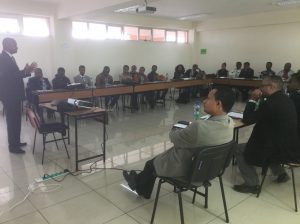The 2017 EGST graduates’ research dissemination workshop deliberated on the annual master thesis findings on July 22, 2017 at EGST. A total of 28 theses were presented and discussed in two tracks consisting of Biblical and Theological Studies (MABTS) on one division and Leadership and Management (MALM) as well as Development Studies (MADevS) on another.
Welcoming the participants on the occasion, Dr. Misgana Mathewos, EGST Director, congratulated the researchers and remarked that the international research community and internal EGST stakeholders are expecting quality research outputs.
Head of Academic Affairs, Dr. Theodros Assefa, encouraged the graduate researchers to develop a practical intent to their research, to learn more lessons from the research process, to find publication avenues and to advance their research skills.
Dr. Seblewengel Daniel, facilitator of the Theology track, remarked that despite the challenges of the research process, frustrations during supervision and examination and the toughness of EGST quality requirements, the purpose is to help you, the researchers to grow and mature in this process. Professor Aklilu Dalelo, after moderating the MADevS track, stated that the objective of a research is not only to fulfill the academic requirements of EGST but also to assist graduate researchers to demonstrate a high class, practical research outcomes that stimulate change in church and society.Dr. Lidetu Alemu, MALM Programme Leader and track facilitator, narrated a metaphor of a monk who had aspired to change the world, his country, his community, and then his family but failed. The metaphor showed the vitality of changing oneself positively. “What lessons are you taking home”, he challenged the participants.It was also learnt that research is one of EGST’s strategic pillars which includes master theses, thematic research projects, individual faculty research and publications, postdoctoral and sabbatical research outcomes and other studies such as alumni workshops. EGST also organizes events related to research dissemination such as annual Frumentius Lectures, monthly academic seminars, and encourages the participation of faculty and staff in other national and international conferences and workshops. The envisioned Ethiopian Journal of Theology is also expected to serve as research publication and dissemination for the future.

